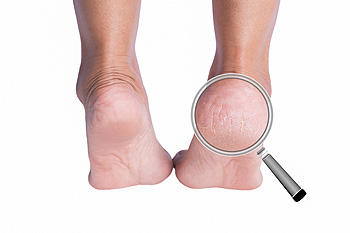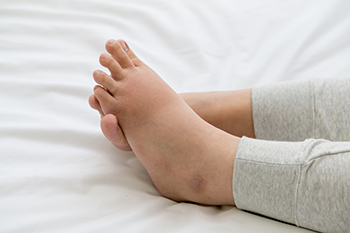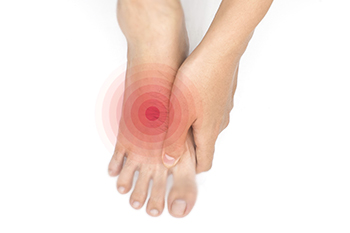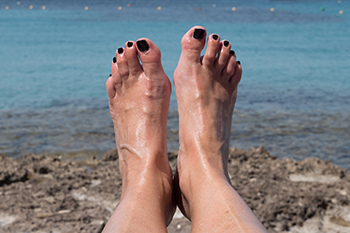Connect With Us
Blog
Items filtered by date: June 2023
How Do Heel Fissures Differ From Cracked Heels?

Heel fissures are cracks or breaks in the skin of the heels and usually form from intense dryness and thickened skin. These cracks can be superficial or deep, and they may bleed or feel painful. Heel fissures may worsen and become infected or turn into skin ulcers, and it is important to treat them to prevent this from happening. There may be underlying conditions that can lead to heel fissures, which can include, but are not limited to, nutritional deficiencies that can cause the skin to lose moisture, and skin ailments that result in inflammation, itching and dryness. Additionally, cracked heels may happen as a result of wearing footwear that does not allow the feet to breathe. People who have diabetes are at risk for nerve damage to the feet, which is referred to as peripheral neuropathy. One of the several problems this can create can affect the nerves on the feet. Sweating may be reduced or stopped, possibly causing a dry environment for skin fissures to develop. If you are experiencing heel fissures, it is strongly suggested that you seek the care of a podiatrist who can determine what the cause is, and offer correct treatment methods.
If the skin on your feet starts to crack, you may want to see a podiatrist to find treatment. If you have any concerns, contact Arthur Segall, Jr., DPM from Segall Foot and Ankle. Our doctor can provide the care you need to keep you pain-free and on your feet.
Cracked Heels
It is important to moisturize your cracked heels in order to prevent pain, bleeding, and infection. The reason cracked heels form is because the skin on the foot is too dry to support the immense pressure placed on them. When the foot expands, the dry skin on the foot begins to split.
Ways to Help Heal Them
- Invest in a good foot cream
- Try Using Petroleum Jelly
- Ease up on Soaps
- Drink Plenty of Water
Ways to Prevent Cracked Heels
- Moisturize After Showering
- Skip a Shower
- Keep Shower Water Lukewarm
- Don’t Scrub Your Feet
If you are unsure how to proceed in treating cracked heels, seek guidance from a podiatrist. Your doctor will help you with any questions or information you may need.
If you have any questions, please feel free to contact our offices located in Plantation, FL Ft. Lauderdale, F . We offer the newest diagnostic and treatment technologies for all your foot care needs.
Pregnancy Can Produce Swollen Feet

Pregnant women often notice how swollen their feet become during this time in their lives. This happens for various reasons. The body naturally produces more blood that can help the fetus to grow. Additionally, the uterus puts pressure on the veins that return blood from the legs, and swollen feet may result. Pregnancy hormones can also have an effect on the veins, and the blood may pool in the ankles and feet. Swollen feet often begin during the second trimester, and can last for the duration of the pregnancy. Effective prevention methods for swollen feet can include frequently elevating the feet, drinking plenty of water daily, and engaging in a simple exercise routine. Some women find it helpful to wear compression stockings, and this may help to manage existing swelling. If your feet and ankles are unusually swollen and uncomfortable during your pregnancy, it is suggested that you visit a podiatrist who can offer you additional relief methods.
Pregnant women with swollen feet can be treated with a variety of different methods that are readily available. For more information about other cures for swollen feet during pregnancy, consult with Arthur Segall, Jr., DPM from Segall Foot and Ankle. Our doctor will attend to all of your foot and ankle needs.
What Foot Problems Can Arise During Pregnancy?
One problem that can occur is overpronation, which occurs when the arch of the foot flattens and tends to roll inward. This can cause pain and discomfort in your heels while you’re walking or even just standing up, trying to support your baby.
Another problem is edema, or swelling in the extremities. This often affects the feet during pregnancy but tends to occur in the later stages.
How Can I Keep My Feet Healthy During Pregnancy?
- Wearing orthotics can provide extra support for the feet and help distribute weight evenly
- Minimize the amount of time spent walking barefoot
- Wear shoes with good arch support
- Wear shoes that allow for good circulation to the feet
- Elevate feet if you experience swelling
- Massage your feet
- Get regular, light exercise, such as walking, to promote blood circulation to the feet
If you have any questions please feel free to contact our offices located in Plantation, FL Ft. Lauderdale, F . We offer the newest diagnostic and treatment technologies for all your foot and ankle needs.
Simple Steps That Can Help Diabetic Patients

Many diabetic patients realize the importance of maintaining proper foot care. This can be an overwhelming task to accomplish, and it is beneficial that small steps are taken that can simplify the process. It is important to engage in a gentle exercise program frequently, and this can help to improve blood circulation to the feet, as well as the overall body. Eating healthy foods that can comprise a healthy diet may help to monitor glucose levels, and existing nerve damage may be controlled. Stress can raise blood pressure, and elevating the feet at the end of the day may give them a needed rest and may help to reduce existing stress. Additionally, inspecting the feet daily can reveal any cuts and scrapes that have developed. Many people who are diabetic experience neuropathy, which is the inability to feel sensation in the feet. Family members or caregivers may help patients to see the soles of their feet by helping them to use a mirror. If you have diabetes, it is strongly suggested that you are under the care of a podiatrist who can help you to manage this condition.
Diabetic foot care is important in preventing foot ailments such as ulcers. If you are suffering from diabetes or have any other concerns about your feet, contact Arthur Segall, Jr., DPM from Segall Foot and Ankle. Our doctor can provide the care you need to keep you pain-free and on your feet.
Diabetic Foot Care
Diabetes affects millions of people every year. The condition can damage blood vessels in many parts of the body, especially the feet. Because of this, taking care of your feet is essential if you have diabetes, and having a podiatrist help monitor your foot health is highly recommended.
The Importance of Caring for Your Feet
- Routinely inspect your feet for bruises or sores.
- Wear socks that fit your feet comfortably.
- Wear comfortable shoes that provide adequate support.
Patients with diabetes should have their doctor monitor their blood levels, as blood sugar levels play such a huge role in diabetic care. Monitoring these levels on a regular basis is highly advised.
It is always best to inform your healthcare professional of any concerns you may have regarding your feet, especially for diabetic patients. Early treatment and routine foot examinations are keys to maintaining proper health, especially because severe complications can arise if proper treatment is not applied.
If you have any questions please feel free to contact our offices located in Plantation, FL Ft. Lauderdale, F . We offer the newest diagnostic and treatment technologies for all your foot and ankle needs.
Are You Suffering From Nerve Damage?
All About Erythromelalgia

Different kinds of relatively rare conditions of the feet affect a small number of people. A condition known as erythromelalgia is one such type of foot affliction. Erythromelalgia is essentially defined by a burning and redness that can develop in the feet. However, the symptoms of erythromelalgia are not confined to the feet. Namely, the symptoms of this condition can also be felt in the hands, arms, legs, and even the face area. Another important symptom that is associated with erythromelalgia is warmness in the skin. Certain activities can trigger one’s erythromelalgia, including feeling stressed and wearing tight shoes. If you are someone that wants to learn more about erythromelalgia and other rare foot conditions, it is suggested that you contact a podiatrist today for more information.
Some foot conditions may require additional professional care. If you have any concerns, contact Arthur Segall, Jr., DPM of Segall Foot and Ankle. Our doctor can provide the care you need to keep you pain-free and on your feet.
Rare Foot Conditions
The majority of foot conditions are common and can be treated by a podiatrist. Standard diagnostic procedures are generally used to identify specific conditions and treatment can be rendered. A podiatrist also treats rare foot conditions which can be difficult to diagnose and may need extra attention and care.
There are many rare foot conditions that can affect children. Some of these can include:
- Freiberg’s disease
- Kohler’s disease
- Maffucci syndrome
Freiberg’s disease - This can be seen as a deterioration and flattening of a metatarsal bone that exists in the ball of the foot. It typically affects pre-teen and teenage girls, but can affect anyone at any age. Symptoms that can accompany this can be swelling, stiffness, and the patient may limp.
Kohler’s disease - This often targets the bone in the arch of the foot and affects younger boys. It can lead to an interruption of the blood supply which ultimately can lead to bone deterioration. The patient may limp or experience tenderness, swelling, and redness.
Maffucci syndrome - This affects the long bones in a child’s foot leading to the development of abnormal bone lesions. They are benign growths and typically develop in early childhood and the bones may be susceptible to breaking.
A podiatrist can properly diagnose and treat all types of rare foot conditions. If your child is affected by any of these symptoms or conditions, please don’t hesitate to call our office so the correct treatment method can begin.
If you have any questions please feel free to contact our offices located in Plantation, FL Ft. Lauderdale, F . We offer the newest diagnostic tools and technology to treat your foot and ankle needs.

